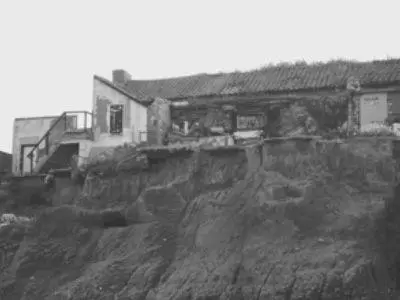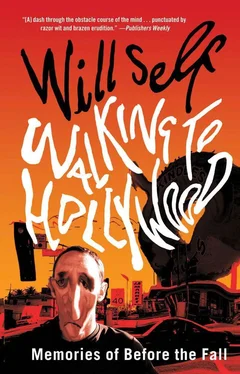Will Self - Walking to Hollywood
Здесь есть возможность читать онлайн «Will Self - Walking to Hollywood» весь текст электронной книги совершенно бесплатно (целиком полную версию без сокращений). В некоторых случаях можно слушать аудио, скачать через торрент в формате fb2 и присутствует краткое содержание. Год выпуска: 2011, Издательство: Grove/Atlantic, Inc., Жанр: Современная проза, на английском языке. Описание произведения, (предисловие) а так же отзывы посетителей доступны на портале библиотеки ЛибКат.
- Название:Walking to Hollywood
- Автор:
- Издательство:Grove/Atlantic, Inc.
- Жанр:
- Год:2011
- ISBN:нет данных
- Рейтинг книги:4 / 5. Голосов: 1
-
Избранное:Добавить в избранное
- Отзывы:
-
Ваша оценка:
- 80
- 1
- 2
- 3
- 4
- 5
Walking to Hollywood: краткое содержание, описание и аннотация
Предлагаем к чтению аннотацию, описание, краткое содержание или предисловие (зависит от того, что написал сам автор книги «Walking to Hollywood»). Если вы не нашли необходимую информацию о книге — напишите в комментариях, мы постараемся отыскать её.
Walking to Hollywood — читать онлайн бесплатно полную книгу (весь текст) целиком
Ниже представлен текст книги, разбитый по страницам. Система сохранения места последней прочитанной страницы, позволяет с удобством читать онлайн бесплатно книгу «Walking to Hollywood», без необходимости каждый раз заново искать на чём Вы остановились. Поставьте закладку, и сможете в любой момент перейти на страницу, на которой закончили чтение.
Интервал:
Закладка:
Spurn Head
And past the poppies bluish neutral distance
Ends the land suddenly beyond a beach
Of shapes and shingle. Here is unfenced existence:
Facing the sun, untalkative, out of reach.
— Philip Larkin, ‘Here’1. Daycare
It was not long after I returned from Los Angeles, in the middle of June 2008, that I began to suspect there was something wrong — with the wider world, certainly, but perhaps also with me. At first I linked the fuzziness and forgetfulness that increasingly plagued me with the bizarre experience of walking to Hollywood; it seemed only just that the extraordinarily rich ebullition gifted me — particularly on the morning when I walked from the Chateau Marmont to Venice along Santa Monica Boulevard — should be compensated for by mental impoverishment.
The body, always a sturdier vessel, had righted itself soon enough: the superpowers I had possessed in LA — enabling me to leap tall buildings, stop buses with the palm of my hand and warp the trajectory of bullets — faded as soon as I reached home. When I tried to show my smaller sons what a hero I’d become by leaping over the wire-mesh fence of the all-weather football pitch in the local park, I threw myself straight into it. The five-a-side players left their ball pattering and came over to mock me where I lay.
But, while physically I simply returned to normal — the dull accommodation of my body, its strip-lit limbs and identical en suite organs — my mental faculties continued to deteriorate. When I came to consider the matter, the fact was that my memory had been eroding for some time: the grey waters of Lethe undercutting its soft cliffs, so that individual recollections — which, no matter how tasteless and bogus, nonetheless had the virtue of being owned outright, not mortgaged — tumbled on to the beach below. I could only posit forgetfulness-withinamnesia to explain how I had confused this with the standardissue agnosia of middle age: names and faces shuffled together, so that I often spent a half-hour or more at a party talking to someone I knew perfectly well, yet whose identity remained obstinately hidden.
Stupidly, I had indulged in special pleading on my own behalf — and for several years this did act as a groyne with which to impede the longshore drift. There was my notoriety, which served to make me more memorable to those I had met than I would’ve been otherwise, and so encouraged them to come forward: ‘You don’t remember me, do you, but… ’ Then there was also the nature of my work, which meant that either I was in solitary reclusion, or else revolving around the country promoting my novels at bookshops and literary festivals. Thrust, blinking, on to podium after stage, I suspected that, while I might be providing sharply etched vignettes for audiences, to me the experience was but part of an on-blurring.
It was true that in the decade since I had stopped drinking and taking drugs my short-term memory seemed to have improved; at any rate, I no longer needed the elaborate system of Post-it notes stuck to the walls of my writing room that had for years served me as a kind of random access. If I maintained this, it was more as an art installation, or magic ritual, designed both to represent the combinatorial powers of the imagination — and to stimulate them to order, then reorder, the tropes, gags, metaphors and observations with which I built my papery habitations. Recency may have been a slippery proposition, happy sociable families a demanding game, but I cleaved to the notion that my textual memory was better than ever. Sadly, this was a delusion; rather, it was my skill alone that had improved: I now wrote books with the workmanlike despatch of a carpenter turning out tables, this busy practice obscuring the loss of much I had once known.

In London, walking from the tube station, before I reached the grey whales’ backs of Frederick Button’s 1952 ferroconcrete bus garage, I passed a row of lime trees planted in circular beds raised above the pavement. Around the low brick walls the tarmac writhed with the slow subterranean flexing of the limes’ roots; while at the base of their trunks was all manner of rubbish: cigarette packets, aluminium cans, beer bottles and sweet wrappers were impaled on spiky shoots. It made an arresting image — this coppicing of trash — and ever since the winter, when I’d first noticed it, I’d reminded myself almost daily to go and photograph the waste-withies. Now it was summer and a thick canopy of leaves hid the mundane fruit. Now it was foetid summer — the atmosphere super-saturated with sweat-metal — and I realized, belatedly, that I had taken the limes for granted.
It was the same with the trees in the local park. As evening shadows flowed between the tower blocks, young men would bring their Staffordshire bull terriers out to be exercised. They tacked back and forth along the spore-smelling streets, human leaning away from canine as if hauling on a rope attached to a wayward boom. Then, in the park, the boys would complacently observe the dogs as they shat, before urging them on to attack the trees. The dogs broke the boughs’ necks, they gored the wrinkled hides — when they were done the oaks, rowans and birches looked as if a shell had exploded nearby, stripping long, white-green slats from their trunks. Eventually, these fell away, leaving only a necklace of dead bark immediately beneath the crown of the tree — and it was this that I forgot to record.
I couldn’t remember names, faces, places I had been and books I had read — but there was also a sinister awareness of estrangement from my immediate vicinity. London, the city of my birth — which I knew, not exhaustively, but well enough to set out from home and find my way almost anywhere intuitively — was becoming alien to me. Weaving among the lunchtime joggers along Rotten Row, then rounding Wellington’s old gaff at Number One, London, I would find myself in uncharted waters, with the effortlessly oriented gulls wheeling insultingly overhead: ‘Heeeere! Heeeere! Heeeere!’ That middle-aged Italian couple — he with puff of smoky beard, she with too youthful T-shirt and bum-bag — would it be too perverse to enquire if I might consult the map they held stretched between them? For I no longer recognized this city, this Londra .
At home, every day I expected to be exposed: my wife or children to arrest me on the stairs and cry, ‘I do not know you!’ Or, worse still, ‘You do not know me, do you?’ Basic mnemonics, long used by me to recall PIN numbers, or the name of the man in the bike shop, now had to be contrived for my nearest and dearest: she is not fat; fat people are D-shaped side on — therefore, her name begins with a D.
I linked the amnesia and the facial agnosia with my growing myopia. Print wasn’t attending to personal grooming: the index of the A-Z began to grow stubble; next it was the turn of the thesaurus. There seemed some logic to this: first I became disoriented — then I was unable to check my orientation; first I failed to recognize my interlocutors — then I was unable to search for synonyms, and so all shades of meaning were balled into monism. ‘This,’ as De Niro’s character in The Deer Hunter philosophized upon a bullet, ‘is this.’ But what did ‘this’ mean? I’d forgotten and could no longer consult the dictionary without glasses.
Still, I kept writing. I was correcting the proofs for a storycycle that was to be published that autumn. For all that I professed — to friends, colleagues, whoever would listen — that I was no longer focused on producing books (like tables, or bullets), but rather thought of the work as my fundamental praxis, my way of mixing my mind with the world and so extending my being — bits of text still had titles, the author’s name and my mugshot on the jacket.
Читать дальшеИнтервал:
Закладка:
Похожие книги на «Walking to Hollywood»
Представляем Вашему вниманию похожие книги на «Walking to Hollywood» списком для выбора. Мы отобрали схожую по названию и смыслу литературу в надежде предоставить читателям больше вариантов отыскать новые, интересные, ещё непрочитанные произведения.
Обсуждение, отзывы о книге «Walking to Hollywood» и просто собственные мнения читателей. Оставьте ваши комментарии, напишите, что Вы думаете о произведении, его смысле или главных героях. Укажите что конкретно понравилось, а что нет, и почему Вы так считаете.












